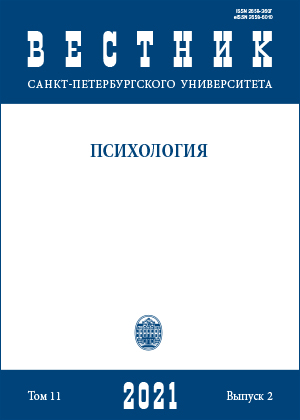Особенности детско-родительского взаимодействия и характеристик поведения у детей с расстройствами аутистического спектра
DOI:
https://doi.org/10.21638/spbu16.2021.204Аннотация
Представлено исследование особенностей и взаимосвязи характеристик поведения детей с расстройствами аутистического спектра (РАС) и качества взаимодействия в паре «мать — ребенок». Ранее было показано, дети с РАС проявляют больше коммуникативной и социальной активности, имеют менее выраженные симптомы аутизма, если их родители демонстрируют высокий уровень чувствительности к потребностям детей и эмоционально вовлечены во взаимодействие с ними. Целью исследования стало изучение особенностей и взаимосвязи характеристик поведения детей с РАС и качества взаимодействия в паре «мать — ребенок». Участниками исследования выступили 29 детей с РАС (возраст 52,4 ± 8,9 месяца). В группу сравнения вошли 36 типично развивающихся детей (возраст 39,7 ± 12,1 месяцев). Детско- родительское взаимодействие изучалось при помощи метода PCERA, включавшего в себя видеозапись матери и ребенка. Характеристики поведения детей исследовались с использованием опросника CBCL/1½-5. Результаты продемонстрировали, что в группе детей с РАС пограничный/клинический уровень выраженности нарушений поведения по DSM-шкалам «Аффективные расстройства», «Устойчивые проблемы развития», «Дефицит внимания / Гиперактивность», «Оппозиционно-вызывающее поведение» и шкалам синдромов «Эмоциональная реактивность», «Тревожность/ Депрессивность», «Агрессивное поведение» связан с такими характеристиками взаимодействия матери с ребенком, как навязчивость, непредсказуемость, ригидность, нечувствительность к сигналам ребенка. В статье обсуждаются психологические механизмы выявленных взаимосвязей.
Ключевые слова:
аутизм, детско-родительское взаимодействие, CBCL/1½-5
Скачивания
Библиографические ссылки
St. Petersburg — USA Orphanage Research Team. The Effects of Early Social-Emotional and Relationship Experience on the Development of Young Orphanage Children. (2008) Monographs of the Society for Research in Child Development, 73 (3). https://doi.org/10.1111/j.15405834.2008.00483.x
Загрузки
Опубликован
Как цитировать
Выпуск
Раздел
Лицензия
Статьи журнала «Вестник Санкт-Петербургского университета. Психология» находятся в открытом доступе и распространяются в соответствии с условиями Лицензионного Договора с Санкт-Петербургским государственным университетом, который бесплатно предоставляет авторам неограниченное распространение и самостоятельное архивирование.




